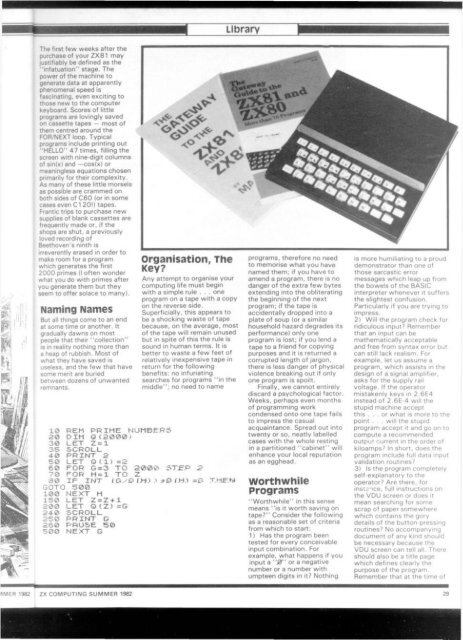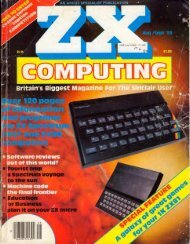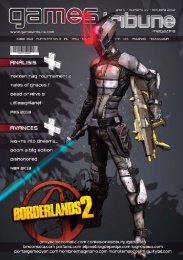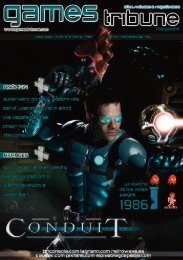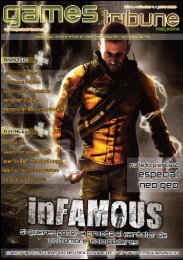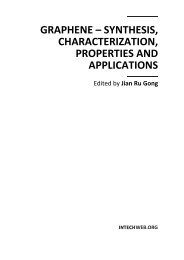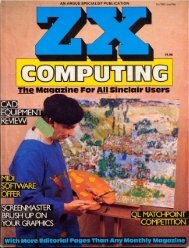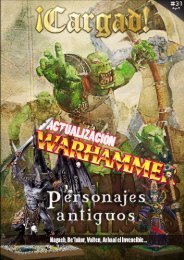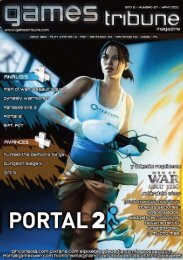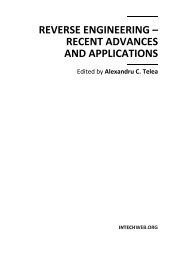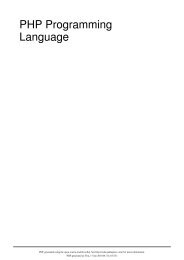ZX Computings - OpenLibra
ZX Computings - OpenLibra
ZX Computings - OpenLibra
Create successful ePaper yourself
Turn your PDF publications into a flip-book with our unique Google optimized e-Paper software.
I<br />
sr<br />
The first few weeks after the<br />
purchase of your <strong>ZX</strong>81 may<br />
justifiably be defined as the<br />
"infatuation" stage. The<br />
power of the machine to<br />
generate data at apparently<br />
phenomenal speed is<br />
fascinating, even exciting to<br />
those new to the computer<br />
keyboard. Scores of little<br />
programs are lovingly saved<br />
on cassette tapes — most of<br />
them centred around the<br />
FOR/NEXT loop. Typical<br />
programs include printing out<br />
"HELLO" 47 times, filling the<br />
screen with nine-digit columns<br />
of sin(x)and —cos(x) or<br />
meaningless equations chosen<br />
primarily for their complexity.<br />
As many of these little morsels<br />
as possible are crammed on<br />
both sides of C60 (or in some<br />
cases even C120!) tapes.<br />
Frantic trips to purchase new<br />
supplies of blank cassettes are<br />
frequently made or, if the<br />
shops are shut, a previously<br />
loved recording of<br />
Beethoven's ninth is<br />
irreverently erased in order to<br />
make room for a program<br />
which generates the first<br />
2000 primes (I often wonder<br />
what you do with primes after<br />
you generate them but they<br />
seem to offer solace to many).<br />
Naming Names<br />
But all things come to an end<br />
at some time or another. It<br />
gradually dawns on most<br />
people that their "collection"<br />
is in reality nothing more than<br />
a heap of rubbish. Most of<br />
what they have saved is<br />
useless, and the few that have<br />
some merit are buried<br />
between dozens of unwanted<br />
remnants.<br />
10<br />
20<br />
30<br />
35<br />
40<br />
50<br />
60<br />
REM PRIME NUMBERS<br />
DIM O(20O0)<br />
LET Z=1<br />
SCROLL<br />
PRINT 2<br />
LET O(l) =2<br />
Organisation, The<br />
Key?<br />
Any attempt to organise your<br />
computing life must begin<br />
with a simple rule . , . one<br />
program on a tape with a copy<br />
on the reverse side.<br />
Superficially, this appears to<br />
be a shocking waste of tape<br />
because, on the average, most<br />
of the tape will remain unused<br />
but in spite of this the rule is<br />
sound in human terms. It is<br />
better to waste a few feet of<br />
relatively inexpensive tape in<br />
return for the following<br />
benefits: no infuriating<br />
searches for programs "in the<br />
middle"; no need to name<br />
FOR G = 3 TO 2000 ST£P<br />
70 FOR H=1<br />
30 IF INT<br />
GOTO 500<br />
100 NEXT H<br />
150 LET Z=Z + 1<br />
200 LET Q(Z)=G<br />
240 SCROLL<br />
250 PRINT G<br />
250 PAUSE 50<br />
50© NEXT G<br />
TO Z<br />
( G.-'tf IHJ > + /.H*<br />
SP<br />
=G THEN<br />
Library<br />
programs, therefore no need<br />
to memorise what you have<br />
named them; if you have to<br />
amend a program, there is no<br />
danger of the extra few bytes<br />
extending into the obliterating<br />
the beginning of the next<br />
program; if the tape is<br />
accidentally dropped into a<br />
plate of soup (or a similar<br />
household hazard degrades its<br />
performance) only one<br />
program is lost; if you lend a<br />
tape to a friend for copying<br />
purposes and it is returned a<br />
corrupted length of jargon,<br />
there is less danger of physical<br />
violence breaking out if only<br />
one program is spoilt.<br />
Finally, we cannot entirely<br />
discard a psychological factor.<br />
Weeks, perhaps even months<br />
of programming work<br />
condensed onto one tape fails<br />
to impress the casual<br />
acquaintance. Spread out into<br />
twenty or so, neatly labelled<br />
cases with the whole resting<br />
in a partitioned "cabinet" will<br />
enhance your local reputation<br />
as an egghead.<br />
worthwhile<br />
Programs<br />
"Worthwhile" in this sense<br />
means "is it worth saving on<br />
tape?" Consider the following<br />
as a reasonable set of criteria<br />
from which to start:<br />
1) Has the program been<br />
tested for every conceivable<br />
input combination. For<br />
example, what happens if you<br />
input a "0" or a negative<br />
number or a number with<br />
umpteen digits in it? Nothing<br />
is more humiliating to a proud<br />
demonstrator than one of<br />
those sarcastic error<br />
messages which leap up from<br />
the bowels of the BASIC<br />
interpreter whenever it suffers<br />
the slightest confusion.<br />
Particularly if you are trying to<br />
impress.<br />
2) Will the program check for<br />
ridiculous input 7 Remember<br />
that an input can be<br />
mathematically acceptable<br />
and free from syntax error but<br />
can stilt lack realism. For<br />
example, let us assume a<br />
program, which assists in the<br />
design of a signal amplifier,<br />
asks for the supply rail<br />
voltage. If the operator<br />
mistakenly keys in 2.6E4<br />
instead of 2.6E 4 will the<br />
stupid machine accept<br />
this ... or what is more to the<br />
point . . . will the stupid<br />
program accept it and go on to<br />
compute a recommended<br />
output current in the order of<br />
kiloamps? In short, does the<br />
program include full data input<br />
validation routines?<br />
3) Is the program completely<br />
self-explanatory to the<br />
operator? Are there, for<br />
instsice, full instructions on<br />
the VDU screen or does it<br />
mean searching for some<br />
scrap of paper somewhere<br />
which contains the gory<br />
details of the button-pressing<br />
routines? No accompanying<br />
document of any kind should<br />
be necessary because the<br />
VDU screen can tell all. There<br />
should also be a title page<br />
which defines clearly the<br />
purpose of the program.<br />
Remember that at the time of<br />
1MER 1382 <strong>ZX</strong> COMPUTING SUMMER 1982 29


